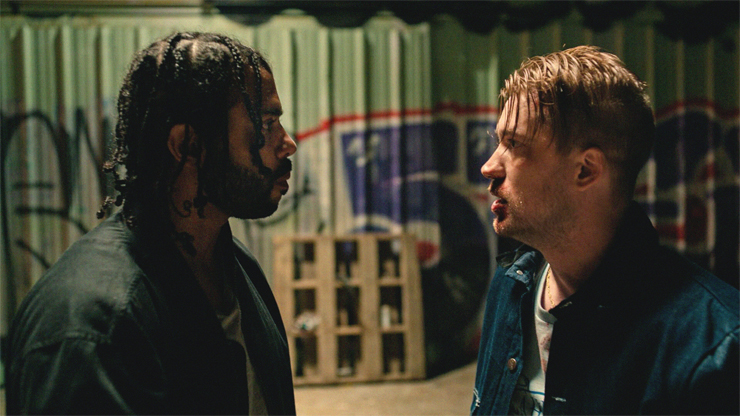
Daveed Diggs, Rafael Casal.
“Blindspotting,” a flashy, in-your-face story about childhood friends dealing with the ripple effects of their actions, opens with a clever split-screen montage that shows two faces of Oakland, California. On the left side are manicured lawns and cheerleader practices. On the right, images of African-American lives, at work, in leisure, dealing with violent unrest, fill the screen. It's a potent juxtaposition, but by the end, the images begin to resemble each other. Point well taken: The city, beset by racial tensions and police-involved skirmishes, is also a melting pot that shows residents from different ethnic backgrounds living together in what can sometimes be referred to as harmony.
Take, for instance, Collin and Miles, best buddies who have been through thick and thin and have never wavered in having the other's back. Not even when Collin (Daveed Diggs) did some time at Santa Rita Jail for an unspecified crime. But lest you think the film that follows is a somber slice-of-life for social justice warriors, director Carlos López Estrada, here making his feature directing debut, tries to bring the funny, early and often.
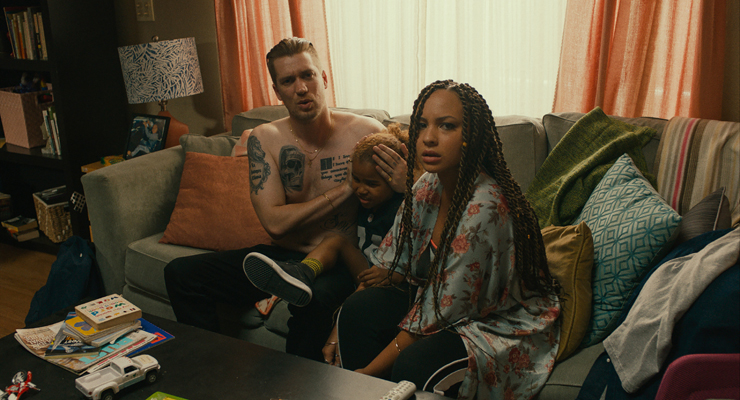
Rafael Casal, Ziggy Baitinger, Jasmine Cephas Jones.
Three days before his probation is scheduled to end, Collin and Miles (Rafael Casal, who also co-wrote the screenplay with Diggs) are sitting in a car, their faces lit in saturated neons. The filmmakers invite you to laugh as Collin half-jokingly chides his friend for making a less-than-legal purchase of a silver revolver right in front of him. (That Screenwriting 101 rule of having a weapon make an encore appearance after it's shown in Act 1 applies here, but I'm getting ahead of myself.)
It soon becomes apparent that Miles, with his swag and culturally appropriated gold grillz, is the yin to Diggs' yang. Sure, Collin is taller, more imposing, but there's a gentleness that immediately sets him apart from his more impulsive pal. And “Blindspotting,” a Jenga tower of broad laughs and overheated melodrama, is at its most tolerable when Diggs taps into that reserve of generosity, such as his scenes with “True Blood's” Janina Gavankar, a sobering presence as Collin's ex-girlfriend/co-worker.
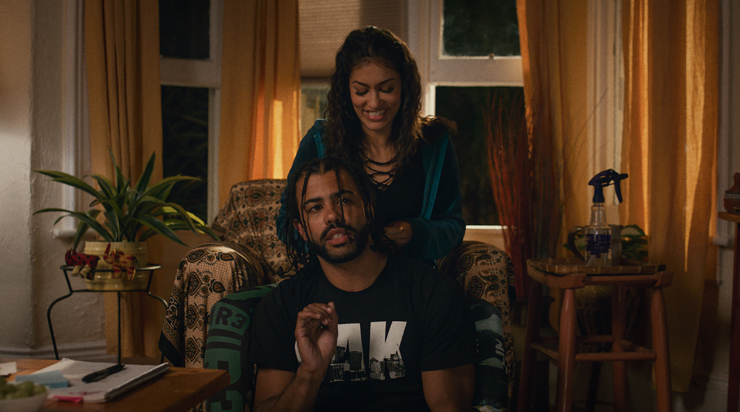
Daveed Diggs, Janina Gavankar.
The movie's scrappy energy serves López Estrada well whenever he's depicting Miles' fairly functional domestic life with longtime girlfriend Ashley (Jasmine Cephas Jones) and their son Sean (Ziggy Baitinger), or chuckling at Collin when he finds out his mom (Margo Hall) has given his childhood bedroom to his much younger stepbrother. The film also makes effective use of Collin and Miles' jobs for a moving company as a window into Oakland's suburban malaise. López Estrada's tonal high-wire act is impressive, at least initially, considering it's been only hours since Collin witnessed a younger African-American man being gunned down by a white police officer (a nearly unrecognizable Ethan Embry) near a stoplight. That judiciously paced and edited sequence, featuring an instantly relatable depiction of a red light that j-j-just w-w-won't c-c-change, hints at the stronger film “Blindspotting” could have been.
Pervasive news coverage of the shooting reiterates the deceased man was armed at the time, but that doesn't come into play when we see the event unfold onscreen. It keeps coming back to haunt Collin in his waking hours; he can't even finish his morning run before the sound of gunshots break his stride. The first red flag as to whether López Estrada is capable of sustaining his tricky balancing act comes during an elaborate dream sequence in which the protagonist's demons gang up on him. It plays like a subpar music video from the '90s.
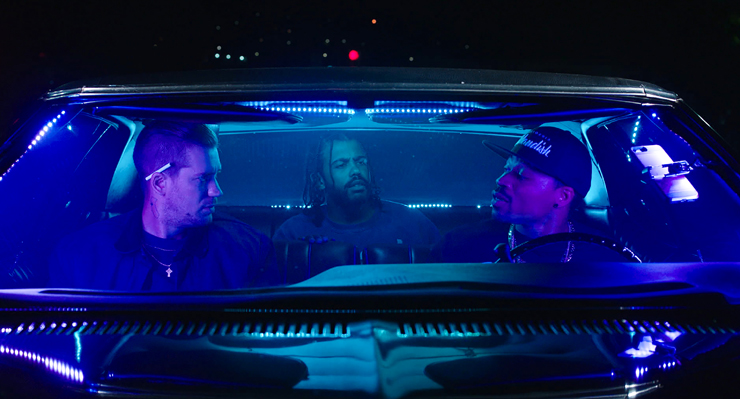
Rafael Casal, Daveed Diggs, Jon Chaffin.
Music video visuals, racial tensions, dexterous juggling of dissimilar genres. “Blindspotting” wears its Spike Lee influence on its sleeve, and why shouldn't it? The work of Edgar Wright also comes to mind, especially when López Estrada uses jump cuts to show characters performing quotidian tasks (i.e. opening car doors, putting on uniforms); a convenience store that's not too different from the one in “Shaun of the Dead” is prominently featured. Problem is, the more it tries to impress viewer with visual curlicues, the more amateurish the movie comes across. The strain undercuts the filmmaker's attempts at looking too cool for school.
But it's when “Blindspotting” reveals what led to Collin's arrest, roughly at the halfway point, where it truly begins to unravel. The flashback scene, rendered with smart-alecky quotations (and saturated hues) firmly in place, doesn't just leech the sequence of all tension and potency. It tries to posit a deeply disturbing act of physical violence as a momentary lapse of judgment. Which lays bare the film's biggest irony: The more it tries to earn the viewer's sympathy for Collin and Miles, the more irredeemable they come across.
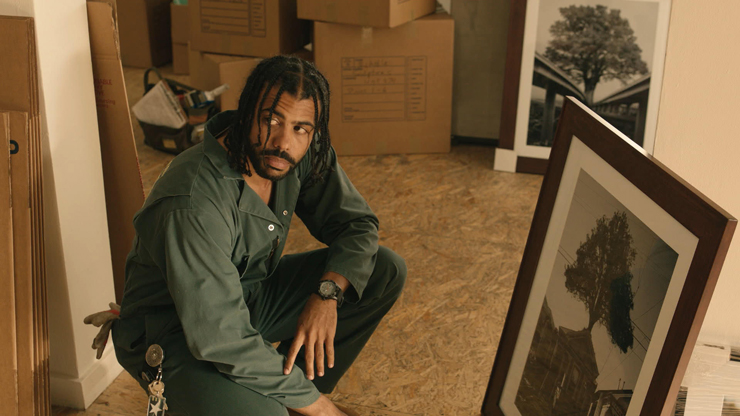
Daveed Diggs.
López Estrada keeps doubling down on a sloppy mix of bro-friendly gags and ripped-from-the-headlines scenarios, but the forced laughs don't sweeten the pill. Instead, they undermine the severity of the subject matter. “Do the Right Thing” will likely come to some moviegoers' minds as “Blindspotting” tailspins into its fraught confrontation between Collin and Miles, but the Lee joint it more closely resembles is “Jungle Fever,” with its dexterously handled shifts between humor and pathos. But whereas that 1991 movie repeatedly pulled off that challenging feat, “Blindspotting” careens between extremes before it devolves into shrill moralizing.
The film showcases Diggs and Casal's gift for spoken rhyme at various intervals, leading to a astonishingly improbable climactic encounter that allows Diggs a chance to unload a lifetime's worth of oppression, and also to give a bullhorn to an entire demographic that's beyond fed up with police brutality. But the moment, cathartic as it might be to some viewers, ultimately rings hollow, not only because it's overly idealized wish fulfillment that brings the movie crashing down, but also because it aims to bring Collin wholly unearned redemption for his past transgressions.
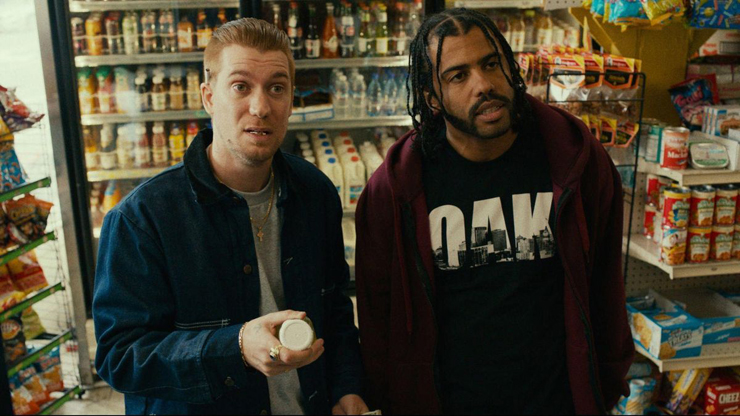
Rafael Casal, Daveed Diggs.
To add insult to injury, “Blindspotting,” a portrait of Oakland that's too enamored of itself, ends in lazy buddy-movie fashion. It appears to let its protagonists off the hook, and reduces the roiling storm it its core to a passing shower. That opening montage, its personality split into halves, ends up being more representative of the finished product than the filmmakers intended. They've made an infuriating misfire that's unable to tie its dueling storylines and genres into a cohesive whole. Hell, meet good intentions. Good intentions, meet hell.
"Blindspotting" opens Friday in movie theaters throughout Miami-Dade and Broward County.
 MAIN MENU
MAIN MENU

